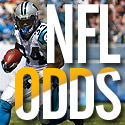Try handing the ball off, knucklehead!
10/24/2002
Codding Home / Sports Channel / Bullz-Eye Home
Think back for a second to the morning of Monday, September 23. It was a fabulous day if you were a New England Patriots fan.
Not so fabulous if you were a St. Louis Rams fan.
On that Monday morning, the Pats and Rams were apparently traveling two distinctly different roads after meeting in New Orleans nearly eight months earlier for Super Bowl XXXVI. The champs from New England hadn't lost since their Big Easy triumph, scoring an average of 38 points per game during an impressive 3-0 start to the 2002 season behind Cinderella quarterback Tom Brady. The Rams, on the other hand, were 0-3 after scoring just 51 total points against the Broncos, Giants and Buccaneers.
A funny thing happened on that Monday morning in late September: The undefeated Patriots were suddenly validated in the eyes of most football fans who had refused to believe in their February victory at the Superdome; meanwhile, the Rams immediately lost their mystique, riding those three-straight losses (four if you include the Super Bowl) from the peak of the mountain all the way down to the treacherous valley below.
New England was 3-0. St. Louis was 0-3.
Perhaps the most amazing thing about the torrid start for the Patriots was the performance of Brady, the Michigan product who relieved incumbent starter Drew Bledsoe a year ago and proceeded to write one of the most improbable championship stories in the history of fairytales and nursery rhymes. Last season, head coach Bill Belichick asked his inexperienced quarterback to simply play mistake-free football, limiting his interceptions while handing the ball off to Antowain Smith 20-plus times per game.
The strategy obviously worked.
But during the first three games this year, Belichick unleashed Brady, transforming him from a Trent Dilfer-like quarterback to a gunslinger suddenly earning comparisons to guys like Brett Favre and, ironically enough, a young Drew Bledsoe. In week one, Brady threw for 294 yards and three touchdowns in a win against the Steelers. The following Sunday, he totaled 269 yards and two more scores in a 44-7 victory over the Jets. And then, in week three, Brady dismembered the Kansas City secondary to the tune of 410 yards on 39-of-54 passing with four touchdown strikes in a 41-38 overtime win.
Meanwhile, Smith, who'd run for 1,157 yards and 12 touchdowns in 2001, hadn't received more than 17 carries in the three early season wins, gaining an average of just 72 yards per game in the process.
But hey, the Pats were 3-0. Why complain? Who cares that they were abandoning the approach that generated a Super Bowl championship just months earlier? They could obviously win with Brady launching 35-plus passes every Sunday -- he was leading the planet in passing yards and New England was undefeated.
In St. Louis, Kurt Warner wasn't nearly as happy as his cross-country counterpart. Oh sure, the yards were still coming in bunches for the reigning MVP -- 315 against Denver, 266 versus the Giants and 301 in Tampa -- but so were the interceptions.
Not to mention all the losses.
Warner tossed just one touchdown against a startling seven picks in those first three games, including four against the Buccaneers. He threw 41 passes a game, completing 29, but Warner just didn't look as crisp on the field as he had the past three years. His throws were off-target, the tight spiral was missing and his decision-making was questionable at best.
And through it all there was Marshall Faulk, undeniably the most dangerous player in football, running for just 38 yards per game while getting only 10 carries each week.
Fantasy owners across the land were outraged, myself included. "Give Marshall the freakin' ball!" we screamed every Sunday, but Mike Martz didn't listen.
Then, week four rolled around and although things didn't change in the standings for the Rams, the stat sheet looked a little different while the depth chart underwent a major conversion. The Cowboys squeaked past St. Louis 13-10 that week but Warner was sidelined early on with a broken pinky and Faulk received more than 15 carries for the first time all year, running for 73 yards on 18 carries. The next week, with backup Jamie Martin behind center, the Rams suffered their worst loss of the season, 37-13, at the hands of the 49ers. Faulk again gained 73 yards on 18 carries in the loss, a sign of better things to come.
During this stretch, the Patriots fell from 3-0 to 3-2 after dropping back-to-back road games in San Diego and Miami. Brady still stood as the triggerman in the New England attack; the problem was, the Pats scored just 27 points in the two losses. The interceptions now came as often as the touchdowns and despite throwing for 353 yards against the Bolts, Brady's QB rating fell below 100 for the first time all year.
Week six was even worse for the defending champs. Green Bay came in to New England and worked over the Patriots, rolling to a 28-10 victory behind precision passing from Favre. Offensively, Brady continued to stumble, throwing for just 183 yards on 24-of-44 passing with one touchdown and three interceptions against a defense that was missing several injured starters.
Mercifully, a bye awaited in week seven.
Just as the situation got uglier for the Patriots, the 0-5 Rams started to figure things out. Faulk ran for 158 yards on 26 carries in a 28-13 win over previously undefeated Oakland, and this past Sunday the former MVP put on a clinic against the Seahawks, totaling 183 yards rushing, 52 receiving and four scores on 39 touches. With Warner on the sidelines and now the untried Marc Bulger subbing for the untested Martin, Martz finally put his season on the shoulders of his best player. And it's worked.
So far.
The Rams sit this week with a bye, which should give Martz time to figure out how to get the ball into his running back's hands with even more frequency, a plan that Belichick reportedly is adopting. "We just need to start all over," the confused coach said after the Green Bay loss. "There's not much to work from." Well Bill, you could always start with Antowain Smith, who owns a healthy 4.5 yards/carry average but has yet to see more than 17 rushing attempts in any one game this year, a number he exceeded nine times in 2001.
Belichick and Martz both seem to finally realize that it's time to feed their horses, but is it too late? The Rams are 2-5, trailing both the 49ers and Cardinals at 4-2. Meanwhile, the Dolphins are 5-2 and the Bills are 4-3, leaving the 3-3 Pats third in the AFC East, potentially fighting for a wild card berth with the leftovers from the remaining three divisions.
The real question here, though, is why did it take Belichick and Martz so long to figure it out? Maybe the aerial attack worked in New England early on but hasn't it been proven time and time again that, to win in the NFL you have to be able to run the ball? Don't believe me?
There have been 102 games played this season so far, and the team that accumulated the most rushing yards has won 72 of those, a .706 winning percentage that 27 teams are currently under. Last week, teams that out-gained their opponents on the ground went 9-5 after going 11-3 and 12-2 the previous two weeks. And in the 30 total losses by teams with more rushing yards than their opponents this year, the losing team had a turnover ratio of -46; in fact, in all but five of those 30 games, the team on the wrong side of the score also lost the turnover battle, which is always a tough hole to climb out of regardless of how well you run the ball.
Kinda makes you wonder why more head coaches don't look at offensive linemen in the first round of the draft each year, huh?
Even more telling, here's a quick look at the six playoff-qualifying teams in each league if the postseason started today, complete with their NFL ranks in both rushing offense and defense:
| Team | Offensive Rushing Rank | Defensive Rushing Rank |
| Miami (5-2) | 5th (142.4 yds/game) | 7th (93.4 yds/game) |
| Pittsburgh (3-3) | 11th (125.3 yds/game) | 6th (92 yds/game) |
| Indianapolis (4-2) | 25th (92.3 yds/game) | 30th (144.5 yds/game) |
| San Diego (6-1) | 2nd (161.7 yds/game) | 2nd (78.7 yds/game) |
| Denver (5-2) | 8th (133.4 yds/game) | 1st (76.3 yds/game) |
| Oakland (4-2) | 17th (108.3 yds/game) | 8th (94.7 yds/game) |
| Philadelphia (4-2) | 4th (143.45 yds/game) | 4th (85.5 yds/game) |
| Green Bay (6-1) | 12th (124.3 yds/game) | 22nd (124.9 yds/game) |
| New Orleans (6-1) | 13th (123.7 yds/game) | 11th (99.1 yds/game) |
| San Francisco (4-2) | 3rd (153.2 yds/game) | 19th (115.2 yds/game) |
| Tampa Bay (5-2) | 24th (93 yds/game) | 5th (89.3 yds/game) |
| Arizona (4-2) | 10th (126.8 yds/game) | 12th (100.2 yds/game) |
The Colts and Packers are the only two teams currently in postseason position that are allowing more rushing yards than they're gaining each week, which doesn't bode well for their chances over the second half of the season. Conversely, perhaps now we can finally understand how the Chargers, Buccaneers and Cardinals are all in playoff contention despite the absence of a prolific quarterback behind center.
Or even a mediocre one in Arizona.
Oh, and in case you're wondering, the Patriots currently stand at 23rd in the NFL with 95 rushing yards/game and 28th with 143.3 yards/game allowed; the Rams, meanwhile, are 16th with 110 yards/game and 10th at 98 yards/game allowed, which could point to a strong second half for Faulk and the Rams.
Assuming, of course, that Faulk still gets 20-plus carries per game once Warner's pinky heals.
Now I know some of you are saying to yourselves that winning teams run the ball more often and more effectively because they're ahead in most games, which in turn allows them to grind out the clock with a sound rushing attack.
I'm not buying it.
Sure, there are plenty of games where, because of some turnovers or costly defensive mistakes, teams suddenly finds themselves down by 24 points in the first half, forcing them to chuck the ball downfield 45 times. But if you run the ball with authority from the opening snap, if you've got a back who can pound out four- and five-yard carries behind a line that opens up some holes, you should be able to play with anybody in this league. If the opposition knows you can't run the ball, though, they'll simply scheme to stop the pass.
Then you've got what we Browns fans like to refer to as the Cleveland Offense -- can't run, can't pass because you can't run, all because of an offensive line that couldn't block the rain with an umbrella.
Of course, having a stout O-line and an explosive ground game doesn't guarantee victory every Sunday -- if it did, the Chiefs (163.1 rushing yds/game; 1st in the NFL) and Vikings (138.7 rushing yds/game; 7th) wouldn't be a combined 4-9. But as teams like the Chargers, 'Niners, Eagles and Dolphins have proved this season, it's a good start.
Now let's see if the Rams and Patriots can run down a postseason invitation.
In the Bullz-Eye
The LA Lakers. Shaquille O'Neal was placed on the injured list following toe surgery, meaning the former MVP will miss at least the first six games of the 2002-03 season. Even when Shaq returns, though, he'll likely be rusty early on and won't be in game shape, all of which points to a dangerously slow start for the three-time defending champs. In his absence, Soumaila Samake will probably start at center... . In other words, get ready to see Kobe Bryant take about 25 shots per game. At least.
Questions/comments? Send
all e-mails to jcodding@bullz-eye.com.






